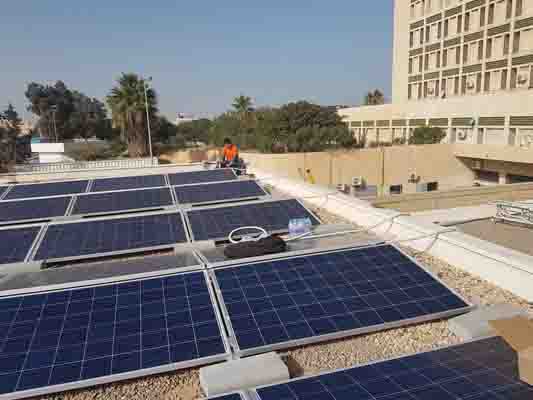Marc-André Franche – UNDP Resident Representative for Libya
Tripoli, June 23, 2023
The global energy landscape is shifting at a drastic pace. In 2023, global investments in renewables will exceed those for oil and gas for the first time. Over the next five years, 90% of new electricity capacity globally will come from renewables. The shift is due to continually falling costs of renewable electricity production and growing public concerns about climate change. This trend presents a significant opportunity for Libya if it takes the steps needed to leverage its abundant solar and wind resources.
Energy transition will decrease demand for oil and gas
As the world celebrated World Environment Day, it is worth recalling the immense benefits of renewable energy for people’s health and the environment. This energy is cleaner, safer, consumes less water and is sustainable. It is also crucial for Libya’s future as the energy transition will eventually decrease demand for oil and gas resulting in falling oil and gas prices.
Libya is well placed
Libya is well placed to exploit this new resource. Due to its location in the heart of the sun belt, one year of solar radiation on each kilometre of land produces energy equivalent to 1.5 million barrels of crude oil. However, while its neighbours are rapidly moving ahead, Libya’s electric power system remains exclusively dependent on hydrocarbons consuming 11 million tons of oil equivalent rather than selling this resource on the international market while prices remain high.
Need regulatory reform to incentivise renewable energy investments
To reposition itself, Libya needs to undertake major changes. This includes enacting an Electricity Law that provides a clear regulatory framework and incentives for renewable energy investments. To make renewables competitive, Libya needs to restructure its electric energy tariff system. Crucially, it needs to redirect its subsidies for oil and gas generated electricity to renewable energy. To improve savings, energy efficiency policies need to be implemented including introducing an energy efficiency labelling system. A regulatory body also needs to be established to monitor compliance and protect consumer rights. These measures are crucial to provide confidence to investors and attract their participation in renewable energy projects.
Break existing monopoly, create space for the private sector
These reforms will create the conditions needed for Libya to finally break the existing monopoly of electric energy production. Creating space for the private sector not only attracts financing but spurs innovation, efficiency, and cost-effectiveness. Once opportunity opens to the private sectors, Libya’s workforce will be able to re-skill itself to work in the renewable energy sector. With sufficient renewable energy capacities, Libya will be able to tap into the potential for green hydrogen production. The emerging green hydrogen market has the potential to provide electricity, heat, transportation fuel, industrial production, and even to provide drinking water.
International community and UNDP can help Libya in this transition
The international community and UNDP can help Libya to facilitate this transition. UNDP’s energy transition programme, in partnership with UNEP, the Ministry of Planning, the Renewable Energy Authority of Libya, the NESDB and others, supports the development and implementation of the National Sustainable Energy Strategy 2035. This includes greater policy and regulatory advice, the roll out of new energy efficiency standards as well as catalysing new major renewable energy generation initiatives by supporting front end development of projects, which is technically and legally intensive.
Need bold action
This support is only effective if Libya undertakes the reforms needed to position itself to prepare for the energy transition. Across the region, from the United Arab Emirates to Morocco, governments are taking bold action to position their countries for the coming transition. It is time for Libya to decide on the future it wants.











